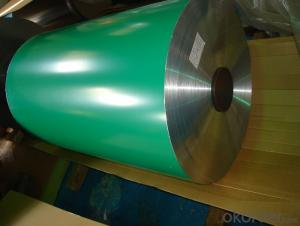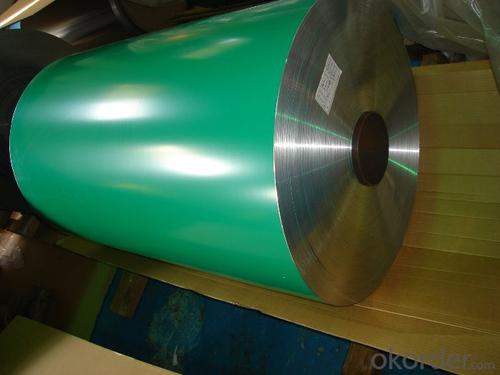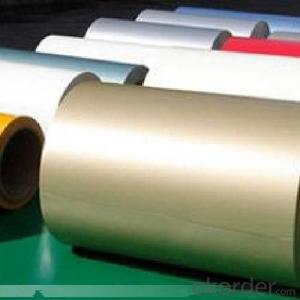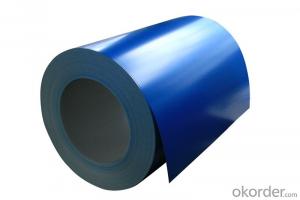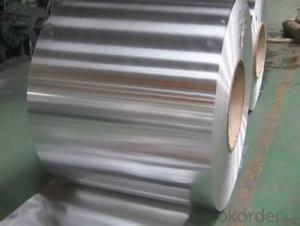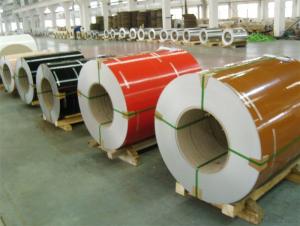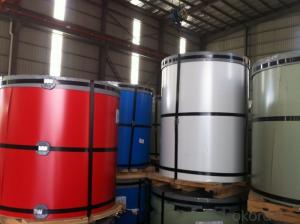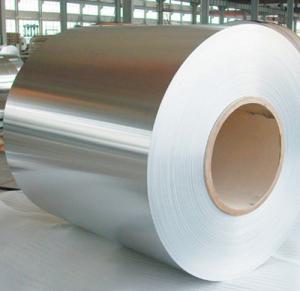Customized Anodized Aluminum Coil - PE Solid and Metallic Color Coated Aluminium Coils with High Quality
- Loading Port:
- Shanghai
- Payment Terms:
- TT OR LC
- Min Order Qty:
- 5 m.t.
- Supply Capability:
- 200 m.t./month
OKorder Service Pledge
OKorder Financial Service
You Might Also Like
Specification
1. Structure of PE Solid and Metallic Color Coated Aluminium Coils with High Quality
PE solid and metallic color coated aluminium coils are with excellent acid-resistance and alkali-resistance. They have super characters in environment protection, flame-resistance, and groovy colors.
PE solid and metallic color coated aluminium coils are widely used for aluminum composite panels. We normally use alloy 3003 and temper H16.
We have different colors for aluminum composite panels. RAL numbers are no problem for us. We also can adjust coating according to color of customers and offer personalized services.
2. Main Features of PE Solid and Metallic Color Coated Aluminium Coils with High Quality
• Light Weight
• Good in strength and rigidity
• High Flatness
• Good Weathering
• Colorful
• Recycling
• Saving Energy
• Rust proof
3. PE Solid and Metallic Color Coated Aluminium Coils with High Quality Images
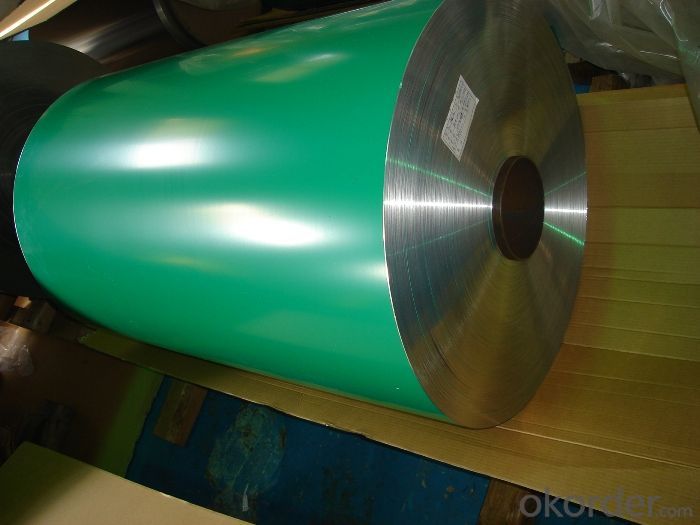
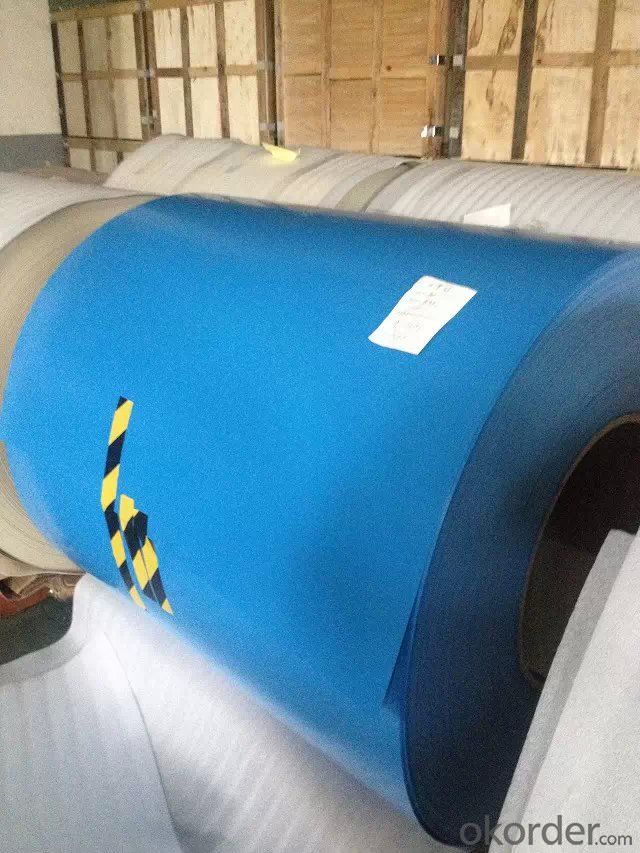
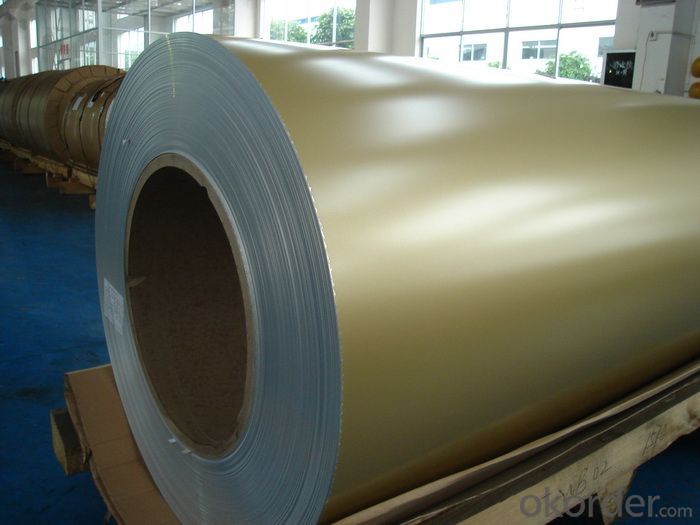
4. Specification of PE Solid and Metallic Color Coated Aluminium Coils with High Quality
ALLOY | TEMPER | THICKNESS | WIDTH | COATING and COLOR |
3003, 3105, etc | H44, etc | 0.2-0.6mm | Less than1600mm | AS PER YOUR REQUIREMENTS |
5. FAQ
A.What about inspections to guarantee quality?
For each order, we will arrange strict inspection for raw materials, inspection during production and inspection for finished goods.
With requirement of customers, we also can arrange the third party inspection.
B.What about delivery?
We will put order in production schedule after order gets confirmed against copy of TT or L/C. Normally it takes about one month for production. Exact shipment schedule is different based on different sizes and quantity.
C.What is the MOQ?
5 tons for each size.
D. Where have you exported?
We have exported to many countries. Main markets include South East Asia, Middle East, North America, South America, etc.
- Q: Can aluminum coils be welded or joined?
- Aluminum coils have the capability to be welded or joined. Aluminum, being a highly weldable metal, can be easily joined through the utilization of different welding techniques. TIG welding, MIG welding, and resistance welding are the most commonly employed methods for welding aluminum coils. TIG welding is a precise and adaptable technique that employs a non-consumable tungsten electrode to generate the arc. This method is extensively utilized in welding aluminum coils due to its ability to offer exceptional control over the welding process, resulting in welds of high quality and strength. On the other hand, MIG welding employs a consumable wire electrode and a shielding gas to safeguard the weld zone from atmospheric contamination. This technique is faster compared to TIG welding and is often favored for larger production runs. Resistance welding is yet another prevalent method employed for joining aluminum coils. It involves the passage of an electric current through the overlapping metal surfaces to generate heat and pressure, thereby creating a robust weld joint. This technique is commonly used in industries that require high-speed production. It is important to note that welding aluminum coils necessitates specific techniques and considerations due to the distinctive properties of the metal. Aluminum possesses a lower melting point and higher thermal conductivity than other metals, which can make the welding process more challenging. Proper cleaning, preheating, and the selection of suitable filler materials are crucial in achieving successful welds. To summarize, aluminum coils can be welded or joined using various techniques such as TIG welding, MIG welding, and resistance welding. However, it is imperative to adhere to proper procedures and take into account the specific properties of aluminum to ensure the creation of strong and dependable welds.
- Q: Explain how aluminum coils function to shield against electromagnetic interference.
- <p>Aluminum coils protect against electromagnetic interference (EMI) through a process known as electromagnetic shielding. Aluminum, being a conductive material, can reflect and absorb EMI, preventing it from penetrating the protected area. When an aluminum coil is used as a shield, it creates an electric field that interacts with the EMI, either reflecting the interference back or absorbing it, thus reducing its impact on sensitive electronic equipment. The high conductivity of aluminum also allows it to distribute the EMI evenly across its surface, minimizing the effect of any single point of entry. This shielding is crucial in various applications, such as in electronic devices and communication systems, to ensure reliable performance and data integrity.</p>
- Q: I take an extracurricular aircraft class, and I got the okay to take some old painted sheet aluminum for another project I'm working on. The problem is, what I'm using it for I need bare aluminum. I heard around that air crafts are painted with something that regular (store-bought) paint stripper can't remove. Is this true? I am aware of the fact that stripping something like that will result in a toxic paint sludge, so I've taken precautions for that. I just need to know if heavy-duty paint stripper from Home Depot will do the job. Thanks :)
- It depends on how old the paint is. If your panel was painted before the 1970's, then pretty much any chemical paint stripper will work. After the 70's, they started using epoxy based primers and paints and those are more resistant to chemical strippers. In any case, wear rubber gloves and breathing protection while using chemical paint strippers. They can burn your skin and create toxic fumes when in use.
- Q: Can aluminum coils be used for roofing?
- Yes, aluminum coils can be used for roofing. Aluminum is a popular and commonly used material for roofing due to its durability, lightweight nature, and resistance to corrosion. It is often chosen for its ability to withstand harsh weather conditions and its long lifespan, making it a suitable option for various roofing applications.
- Q: Why does the coated aluminum coil have thickness requirement for membrane?
- The purpose of coating is to protect the surface of aluminum coil and make it more aesthetic. The thickness of membrane is closely related to the keep years of products made by aluminum coil.
- Q: Can aluminum coils be bent or shaped?
- Yes, aluminum coils can be bent or shaped with the appropriate tools and techniques.
- Q: Can aluminum coils be used in the manufacturing of cans and containers?
- Yes, aluminum coils can be used in the manufacturing of cans and containers. Aluminum is a lightweight and durable material that is widely used in the packaging industry. Aluminum coils are typically rolled into thin sheets, which are then cut and formed into the desired shape for cans and containers. These coils provide a cost-effective and efficient way to produce large quantities of cans and containers, as they can be easily processed and shaped. Additionally, aluminum is a highly recyclable material, making it environmentally friendly and sustainable for the packaging industry. Overall, aluminum coils are commonly used in the manufacturing of cans and containers due to their versatility, durability, and recyclability.
- Q: How are aluminum coils protected against corrosion during storage?
- Various methods and precautions are employed to protect aluminum coils against corrosion during storage. One commonly used approach involves applying a protective coating or film to the surface of the coils. This coating acts as a barrier, preventing direct contact between moisture and oxygen and the aluminum, thereby preventing corrosion. Another method involves using desiccants or moisture-absorbing materials. These materials are often placed within the packaging or storage containers alongside the aluminum coils to absorb any existing moisture. By reducing the moisture levels in the storage environment, the risk of corrosion is significantly reduced. Proper storage conditions are also crucial in safeguarding aluminum coils against corrosion. It is essential to store the coils in a dry, well-ventilated area, away from direct sunlight and other sources of moisture. Additionally, it is important to ensure that the coils are stored above ground and kept separate from any chemicals or substances that may cause corrosion. Regular inspections and maintenance are necessary to prevent corrosion during storage. This includes checking for any signs of damage or wear on the protective coating and promptly addressing any issues that arise. Furthermore, maintaining a clean storage environment, free from dust, dirt, and other contaminants, helps preserve the integrity of the protective coating and prevents corrosion. In summary, a comprehensive approach consisting of protective coatings, moisture-absorbing materials, proper storage conditions, and regular maintenance is essential for effectively protecting aluminum coils against corrosion during storage. These measures ensure that the coils remain in optimal condition and are readily available for use when needed.
- Q: What are the various classifications of aluminum coil grades?
- <p>Aluminum coils are classified into different grades based on their composition and properties. The most common grades include 1000 series (99% pure aluminum), 3000 series (aluminum-manganese alloys), 5000 series (aluminum-magnesium alloys), and 6000 series (aluminum-silico-magnesium alloys). Each series has specific characteristics, such as corrosion resistance, formability, and strength, which determine their suitability for various applications like construction, transportation, and packaging. Additionally, there are 2000 series (aluminum-copper alloys), 4000 series (aluminum-silicon alloys), 7000 series (aluminum-zinc-magnesium alloys), and 8000 series (other alloys), each with unique properties and applications.</p>
- Q: Can aluminum coils be used in chemical processing equipment?
- Yes, aluminum coils can be used in chemical processing equipment. Aluminum is known for its corrosion resistance and high thermal conductivity, making it suitable for various chemical processing applications. However, it is important to consider the specific chemical and operating conditions to ensure compatibility and prevent any potential reactions or damage to the equipment.
Send your message to us
Customized Anodized Aluminum Coil - PE Solid and Metallic Color Coated Aluminium Coils with High Quality
- Loading Port:
- Shanghai
- Payment Terms:
- TT OR LC
- Min Order Qty:
- 5 m.t.
- Supply Capability:
- 200 m.t./month
OKorder Service Pledge
OKorder Financial Service
Similar products
Hot products
Hot Searches
Related keywords
